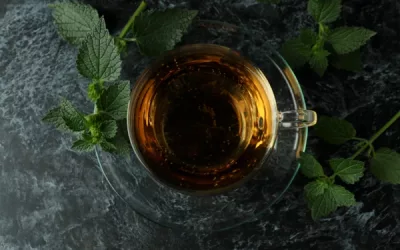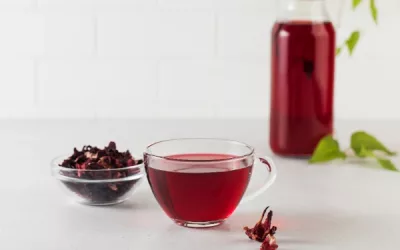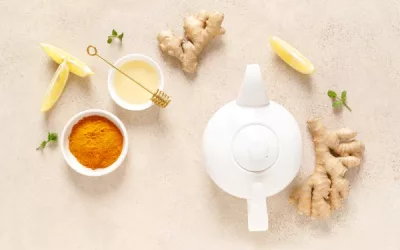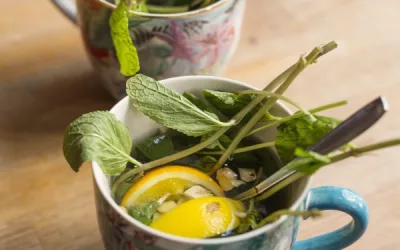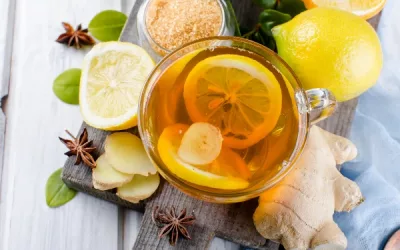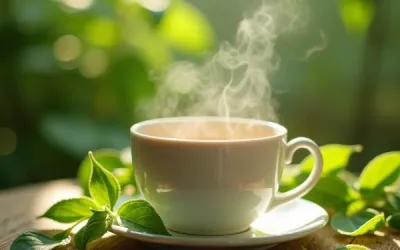Did you know that fennel seeds have been used for thousands of years, not just for their delicious flavour, but also for their impressive health benefits? Fennel tea, a delightful and aromatic herbal infusion, is gaining popularity among health enthusiasts as a natural remedy for various ailments. This comprehensive guide will explore the many advantages of fennel tea, how to prepare it at home, potential side effects, and its rich historical and cultural significance. Join us as we uncover why this ancient brew deserves a spot in your daily routine.
Table of Content
- What is fennel tea?
- How can you prepare fennel tea at home?
- Are there any side effects of drinking fennel tea?
- What are the historical uses of fennel?
- How can fennel tea be used in culinary applications?
- How can fennel tea be used as a flavouring agent?
- What are some recipes that incorporate fennel tea?
- What foods pair well with fennel tea?
- What are the cultural significances of fennel?
- What cultural practices involve the use of fennel?
- How is fennel represented in folklore?
- What are the symbolic meanings of fennel?
- Conclusion
What is fennel tea?
Fennel tea is a herbal infusion made from the seeds of the fennel plant (Foeniculum vulgare), known for its licorice-like flavor and numerous health benefits. Fennel has been used for centuries in traditional medicine, and its tea is often consumed for its soothing properties.
Rich in antioxidants and anti-inflammatory compounds, fennel tea is believed to aid digestion, reduce bloating, and alleviate gas. It also contains essential nutrients like vitamin C, potassium, and fiber, which support overall health.
In addition to its digestive benefits, fennel tea is often used as a natural remedy for respiratory issues, helping to reduce congestion and soothe sore throats. The tea is also known to have mild diuretic properties, which may help in detoxifying the body and promoting kidney health.
Its calming effects make it a popular choice for those seeking a gentle, caffeine-free alternative to traditional teas, especially for relaxation and stress relief.
In ancient Rome, people believed in the powerful healing properties of fennel. Pliny the Elder, a Roman author and naturalist, documented over 22 uses for fennel, including its ability to improve vision and combat digestive issues. Its long-standing presence in traditional medicine underscores its effectiveness and reliability.
Personally, I started drinking fennel tea after a friend recommended it for my bloating issues. Initially skeptical, I soon realised how effective it was. Not only did my digestion improve, but I also felt less anxious and more relaxed overall. Now, fennel tea is a staple in my pantry, and I always reach for it when I need a calming and therapeutic drink.
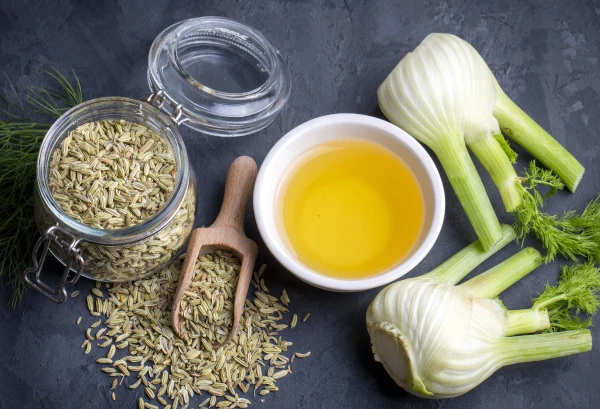
How can you prepare fennel tea at home?
Preparing fennel tea at home is simple and rewarding. Whether you use fresh fennel seeds, dried fennel seeds, or pre-packaged tea bags, each method offers a unique experience and taste.
Below, you’ll find a comprehensive table that outlines different methods to prepare fennel tea, including the necessary ingredients, steps, and the time required for each method.
This way, you can choose the method that best suits your preference and availability.
Methods of Preparing Fennel Tea
| Method | Ingredients | Steps | Time Required |
|---|---|---|---|
| Fresh Fennel Seeds | 1 tsp fresh fennel seeds, 1 cup water | – Crush the seeds – Boil water – Add seeds to boiling water – Steep for 10 min – Strain and serve |
15 min |
| Dried Fennel Seeds | 1 tsp dried fennel seeds, 1 cup water | – Crush the seeds – Boil water – Add seeds to boiling water – Steep for 10 min – Strain and serve |
15 min |
| Pre-packaged Tea Bags | 1 fennel tea bag, 1 cup hot water | – Boil water – Place tea bag in a cup – Pour hot water over tea bag – Steep for 5-7 min – Remove tea bag and serve |
10 min |
| Fresh Fennel Bulb | 1/2 fresh fennel bulb, 1 cup water | – Chop fennel bulb – Boil water – Add chopped bulb to boiling water – Steep for 15 min – Strain and serve |
20 min |
| Fennel Tea with Honey | 1 tsp fresh/dried seeds, 1 cup water, honey | – Prepare tea using any seed method – Add honey to taste – Stir and serve |
12-17 min |
| Iced Fennel Tea | 1 tsp fresh/dried seeds, 2 cups water, ice | – Prepare tea using any seed method – Cool to room temperature – Add ice and serve |
25 min |
Use this table as a guide to explore different ways of making fennel tea at home. Each method has its own charm, from the robustness of fresh seeds to the convenience of tea bags.
What are the benefits of fennel tea?
Fennel tea is packed with health benefits, making it a popular choice among those interested in natural remedies and alternative medicine. Drinking fennel tea can help with various health concerns and improve overall well-being.
- Digestive aid: Helps reduce bloating and gas.
- Anti-inflammatory properties: Eases inflammation and pain.
- Antioxidant-rich: Protects cells from damage.
- Menstrual relief: Alleviates menstrual cramps.
- Immune booster: Supports immune system function.
- Hydration: Keeps you hydrated.
Fennel tea is not only delicious but also offers numerous health benefits. By incorporating it into your daily routine, you can enjoy its soothing and healing properties.
Are there any side effects of fennel tea?
While fennel tea is generally safe for most people, there are a few potential side effects to keep in mind. It’s important to be aware of these before incorporating it into your regular diet.
- Allergic reactions: Some individuals may be allergic to fennel.
- Hormonal effects: May act like estrogen, so caution for those with hormone-sensitive conditions.
- Digestion issues: Overconsumption can lead to stomach cramps and diarrhoea.
- Interaction with medications: May interfere with certain medications.
- Pregnancy concerns: Consult a healthcare professional before use during pregnancy.
Fennel tea is beneficial, but moderation is key. Be mindful of any adverse reactions and consult a healthcare professional if you’re unsure whether fennel tea is suitable for you.
In ancient Greece, Hippocrates, the father of medicine, recommended fennel for its medicinal properties. He used it to treat various ailments, recognising its potential as a natural remedy. Fennel’s use in herbal medicine has stood the test of time, proving its value in health and wellness.
I remember when I first tried fennel tea. I was sceptical about its taste, but after a few sips, I was pleasantly surprised by its mild, licorice-like flavour. It quickly became a part of my evening routine, helping me unwind after a long day.
The calming effect it had on my digestion was an added bonus. Now, I can’t imagine my evenings without a warm cup of fennel tea.
Are there any side effects of drinking fennel tea?
So, you’re eyeing that cup of fennel tea like it’s the elixir of life, eh? Well, hold your horses. Despite its reputation as a magical potion for digestion and a stress-buster, fennel tea has its downsides too. Let’s break it down – allergic reactions, estrogenic effects, pregnancy concerns, medication interactions, and what happens if you overdo it.
While fennel tea can be the superhero you need in your herbal tea lineup, it’s wise to know the dark side too. Think of it like knowing your favourite superhero’s weakness – because even Superman can’t handle kryptonite, right?
This helps set the stage for a more informed appreciation and responsible consumption of fennel tea.
What are the allergic reactions associated with fennel tea?
Ah, allergies – the unwelcome party crashers. While fennel tea is generally safe for most, some folks aren’t so lucky. Allergic reactions can vary from annoying to flat-out alarming.
- Rash or Hives: Like Freddie Krueger decided to leave his mark on your skin.
- Swelling: Puffiness in the face, lips, or tongue. Fun times, not.
- Difficulty Breathing: Imagine running a marathon while breathing through a straw.
- Itching: That irresistible urge to scratch like you’ve got a flea infestation.
- Anaphylaxis: The rare but serious ‘call the ambulance’ type reaction.
If you’re someone with a known sensitivity to fennel or other related plants like celery, carrot, or mugwort, it’s best to steer clear or consult your doctor.
How can fennel tea affect pregnant women?
Here’s a shoutout to all the mums-to-be: what you sip on matters. Fennel tea might not be the ideal nurturing companion during pregnancy.
- Estrogenic Effects: Fennel has compounds that mimic estrogen – your body doesn’t need extra hormonal drama right now.
- Preterm Labour: Anything that could potentially jumpstart contractions is a no-no.
- Milk Production Issues: Postpartum, it could mess with your milk supply or, conversely, aid it – talk about mixed signals.
- Uterine Stimulation: Avoid unnecessary ‘gym sessions’ for your uterus.
So, chat with your healthcare provider before inviting fennel tea to your pregnancy tea party.
What are the risks of overconsumption of fennel tea?
You might be tempted to go gung-ho on fennel tea, but overindulgence can make even the healthiest of things turn rogue.
- Digestive Distress: Irony at its finest – excess fennel can cause bloating and stomach cramps.
- Hormonal Imbalance: Estrogen mimicry can mess with hormonal equilibrium.
- Seizures: Rare, but over-the-top consumption could lead to neurological issues.
- Photodermatitis: Your skin might react to sunlight much like a vampire’s – break out in reactions.
Keep it moderate, folks. It’s the same reason you don’t eat an entire cake in one sitting – moderation makes the magic work.
Fennel tea has been appreciated for its benefits and despised for its side effects even in ancient times. The Romans, for example, used fennel both as a flavouring agent and a medicine. However, the famous Roman naturalist Pliny the Elder warned about its overuse, attributing some inexplicable ailments to it.
Turns out even 2,000 years ago, they understood that moderation is key. So, sip wisely and enjoy the best of what this potent herbal tea has to offer – without the historical pitfalls.
What are the historical uses of fennel?
Ah, fennel! You’d think it’s just another plant trying to make its way in your garden. Wrong! Let’s dive into its impressive resume. From warding off evil spirits to earning its stripes in ancient kitchens and medicines, fennel’s been around the block.
Historically, fennel was pretty much the Swiss Army knife of herbs. In the Middle Ages, it was thought to be the ultimate ghostbuster – hanging fennel on doorways was believed to fend off those pesky evil spirits. No sage required, just good old fennel.
Culinary-wise, fennel had its fifteen minutes of fame in ancient Rome, Greece, and Egypt. Back then, its seeds and leaves were the secret ingredient in many dishes. Doctors (or what they called doctors back then) also swore by it for digestive issues and respiratory ailments.
Fast forward to the Middle Ages, when it wasn’t just about fighting off phantoms. This tiny herb was a household name. Even historical figures like Emperor Charlemagne had a soft spot for it. He was so fond of fennel that he ordered it to be grown in the imperial gardens for its medicinal properties.
How was fennel used in the Middle Ages?
Picture this: The Middle Ages, an era where everything had a hint of mysticism. Fennel was a superstar not just for culinary uses, but also for spiritual and medicinal purposes.
- Used as a charm to ward off evil spirits and witches
- Incorporated in homemade remedies to aid in digestion
- Applied in poultices to treat insect bites and wounds
- Hung in doorways during Midsummer’s Eve to keep away ghosts and other supernatural beings
- Added to livestock feed to promote their wellbeing
Yes, back then, fennel had a job description longer than your average résumé. People hung it over doorways to block evil spirits and witches. Because obviously, evil spirits can’t handle fennel. Digestive issues? Brew some fennel and call it a day. Got a wound? Rub some fennel on it. Seriously, they had fennel, and they were going to use it for just about everything.
What were the culinary uses of fennel in ancient cultures?
Ancient gastronomes couldn’t get enough fennel. It took the stage in kitchens across ancient Rome, Greece, and Egypt, dazzling dishes with its aromatic seeds and fronds.
- Added to salads for a licorice-like freshness
- Used in soups and stews as a flavour enhancer
- Ground into a spice mix for meats and fish
- Brewed in teas for its soothing digestive properties
- Acted as a fennel stuffing for roasted dishes, especially in ancient Rome
Ancient chefs didn’t hold back when it came to fennel. It brought a crisp, anise flavour to salads and soups that even Gordon Ramsay couldn’t yell at. They ground the seeds to add to meat and fish, because why have bland protein when you can have fennel-inspired protein? And of course, fancy a digestive tea after a Roman feast? You’d bet it was fennel.
Which historical figures valued fennel and why?
Certain historical heavyweights had their fondness for fennel. Charlemagne? Absolutely. Pliny the Elder? Oh, for sure. These dudes weren’t just flexing their intellectual muscles; they knew fennel was the real deal.
- Charlemagne: Mandated its cultivation for its medicinal benefits
- Hippocrates: Prescribed fennel for its digestive properties
- Pliny the Elder: Highlighted its multiple uses in his writings
- Dioscorides: Documented its healing powers in his works
- Hildegard of Bingen: Recommended fennel for various ailments in her medicinal texts
Charlemagne was like, “Grow this stuff in the royal gardens,” because he knew it was medicinal gold. Hippocrates, the father of medicine, didn’t give everyone a prescription but definitely loved fennel for its digestive prowess.
Pliny the Elder thought fennel was so remarkable he couldn’t stop writing about it. And Hildegard of Bingen? She was all about fennel in her medicinal texts. Clearly, historical figures weren’t immune to the fennel charm.
Back in ancient Rome, fennel was also tied to strength and courage. Roman warriors believed munching on fennel seeds before battle would give them the bravery of a lion. Now, this might sound a bit like ancient bro-science, but anything for a morale boost on the battlefield, right?
So, there we have it! Fennel: the unsung hero of the herb world with a history richer than a billionaire’s bank account.
How can fennel tea be used in culinary applications?
Fennel tea isn’t just for sipping on a chilly evening or calming your digestive system. You can unleash its aromatic magic in the kitchen too. Welcome to the world where this herbal brew morphs into a culinary superstar. It’s time to revolutionise your cooking with some fennel tea flair!
First, picture using fennel tea as a flavouring agent. Think bath soak, but for your chicken or veggies. Next, let’s dive into recipes that either feature fennel tea brazenly or subtly entwine its flavours.
Lastly, we’ll explore what foods pair well with this aromatic wonder. Get ready to be the culinary wizard of your social circle.
How can fennel tea be used as a flavouring agent?
Fennel tea as a flavouring agent? Oh, it’s a game-changer, my friend. Imagine infusing your soups, sauces, or curries with a gentle hint of fennel. Here’s how you do it:
- Soup Stock: Brew some fennel tea and use it as a base for soups. Trust me; it brings an earthy, slightly sweet undertone.
- Marinades: Use it to marinade chicken, fish, or tofu. Fennel tea adds a unique depth of flavour that’ll leave everyone guessing your secret ingredient.
- Boiling or Steaming Liquid: Use it instead of water when boiling rice or steaming veggies for an aromatic twist.
- Sauces and Gravies: Enhance the flavours of your sauces and gravies by adding fennel tea. You’ll get that herbal complexity that makes people go “Mmm, what’s in this?”
Fennel tea doesn’t just elevate the flavour profile of dishes; it also brings a ton of benefits. Rich in antioxidants and boasting anti-inflammatory properties, it’s like inviting a healthy guest to your culinary party.
What are some recipes that incorporate fennel tea?
Roll up your sleeves, it’s time to get down to culinary business. Here are some fantastic recipes where fennel tea can shine:
- Fennel-Infused Vegetable Stir Fry: Brew a strong fennel tea, and use it to steam your favourite veggies before adding them to the wok.
- Fennel Tea and Lemon Chicken: Marinate chicken breasts in fennel tea, lemon zest, and some olive oil. Grill to perfection.
- Herbal Fennel Tea Risotto: Use brewed fennel tea in place of some of your broth when making risotto. It adds an unexpected yet delightful layer of flavour.
- Fennel Tea Bread: Substitute water with fennel tea when making bread dough. The subtle infusion will have people singing your praises.
Using fennel tea isn’t just about adding flavour; it’s about creating a narrative with each dish. These recipes will have you telling a story with every bite.
What foods pair well with fennel tea?
When it comes to pairing foods with fennel tea, the world is your oyster (or should I say fennel bulb?). Foods that harmonise well with its unique flavour include:
- Seafood: Think prawns, scallops, and white fish. Fennel tea’s mild anise-like flavour enhances the delicate taste of seafood.
- Poultry: Chicken and turkey marinated or cooked with fennel tea are mouth-wateringly good.
- Root Vegetables: Carrots, parsnips, and potatoes sing in harmony with fennel tea’s earthy notes.
- Citrus Fruits: Lemons, oranges, and grapefruits pair wonderfully, balancing fennel tea’s sweetness.
Incorporating fennel tea doesn’t just amplify the taste; it complements and enhances the natural flavours of these foods. Your taste buds will have a gala time.
Speaking of culinary history, let me tell you about Catherine de Medici. This 16th-century Italian noblewoman, joining the French court, brought along something that changed French cuisine forever: the use of herbs. Though she didn’t have fennel tea specifically, her penchant for aromatic herbs laid the groundwork for their extensive use in cuisine. If she could see you now, using fennel tea to transform your dishes, she’d probably give a royal nod of approval.
So, go ahead—infuse your culinary creations with fennel tea and channel your inner culinary maven. The kitchen awaits your herbal mastery!
What are the cultural significances of fennel?
Fennel, that charming herb you’ve probably seen sprinkled over your salad or floating in your soup, packs more than just a punch of flavour. Its cultural significance runs deeper than your spice rack.
Fennel has woven itself into the fabric of various cultures, folklore, traditional festivals, and even the arts and literature. So, let’s strip back the layers and explore why this herb isn’t just another green leaf.
Historically, fennel’s cultural footprint is as rich as its aroma. From its use in ancient ceremonies to its presence in fairy tales, fennel has left quite an impression. For example, in ancient Greece, it was used in rituals and believed to have protective qualities.
Keats didn’t just dream up a bunch of random plants to pen down; no, fennel found its way into tales and symbolisms, embodying a range of meanings from strength to vitality. Let’s dive deeper into the cultural practices, folklore, and symbolic meanings of this versatile herb.
What cultural practices involve the use of fennel?
Fennel has practically seen it all—rituals, celebrations, you name it. Here’s a rundown:
- Ancient Greek Festivities: They didn’t just don togas and philosophise. Greeks used fennel in their Thesmophoria festival, a celebration dedicated to Demeter and Persephone.
- Roman Gastronomy: Romans weren’t just about gladiators; they spiced up their cuisine with fennel, often using it to flavour their wine and as a digestive aid post-feasts.
- Indian Ayurveda: Ayurveda isn’t just about yoga and incense sticks. It holds fennel in high esteem for its digestion-enhancing properties, often recommending fennel tea post-meal.
- Chinese Traditional Medicine: Think you need a break from acupuncture? How about a dose of fennel tea? Traditional Chinese Medicine considers it a warming herb, great for those chilly damp days.
- European Festivals: In parts of Europe, fennel was hung over doors to ward off evil spirits during midsummer festivals.
These practices show that fennel isn’t just a pantry staple; it’s a herb with a heritage, threading its way through ceremonies and culinary traditions across the globe.
How is fennel represented in folklore?
Step into the world of folklore and fennel pops up more often than you’d expect. Here’s why:
- Protection Against Evil: In medieval times, fennel was believed to fend off witches and evil entities. Proverbs claim that hanging fennel in doorways kept sinister spirits at bay.
- Symbols of Strength: Fennel wasn’t just window dressing; it served as a symbol of strength for warriors. The Greek word for fennel, ‘marathon,’ is notable in this context. Yes, the same name graces your 42.195 km run, stemming from the Battle of Marathon where fennel fields were plenty.
- Healing Powers: With alleged magical properties, mothers in various cultures stuffed pillows with fennel seeds to protect their infants from harm and ensure a good night’s sleep.
- Biblical Mentions: Fennel even gets a nod in Christianity, symbolising enduring qualities. St. John’s wort, mixed with fennel, was believed to drive away witches during the Middle Ages.
This isn’t your average piece of folklore. Fennel has enjoyed a rich narrative, integrated into cultural tales and beliefs, often cherished for its ‘magical’ attributes.
What are the symbolic meanings of fennel?
Fennel isn’t just rooted in folklore; it symbolises a range of cultural values. Let’s uncover them:
- Longevity and Endurance: Thanks to its robust nature and durability, fennel often symbolises longevity and endurance.
- Strength and Victory: Going back to Greece, the very mention of fennel is tied to victory and warrior strength.
- Purity and Clarity: Clearing up muddled thoughts? According to some traditions, fennel symbolises clarity and purity, making it a metaphorical broom for the mind.
- Protection and Safety: As elaborated in folklore, fennel’s presence in homes was believed to shield against evil.
- Healing and Nourishment: Perennial and hardy, fennel represents healing and nourishment in many cultures, speaking to its role in traditional medicine.
These symbolic meanings make fennel more than just an ingredient in your favourite dish. It has become a recurring motif in human history, representing qualities many cultures hold dear.
In the time of the plague, people created ‘plague water’, a potent concoction claimed to ward off the deadly disease. This mixture contained fennel seeds, among other herbs. The belief in fennel’s protective ability ran so deep that it was a frontline defence against one of history’s most devastating pandemics.
While the science behind its efficacy is up for debate, there’s no denying fennel’s deeply embedded presence in numerous cultural practices and beliefs. So next time you sip on fennel tea, remember, you’re part of a historic continuum of people seeking health and protection through this remarkable herb.
Conclusion
Reflecting on the wealth of information regarding fennel tea, it is clear that this herbal infusion offers a multitude of benefits that extend well beyond its delightful flavour. From its ability to support digestion to its antimicrobial properties and historical significance, fennel tea presents a compelling case for those keen to explore natural remedies.
As I delved into the health benefits, preparation methods, and even its cultural relevance, I was struck by how this simple beverage can be a remarkable ally for both wellness and culinary adventures.
The insights I gained reaffirmed the importance of herbal remedies in our daily lives, highlighting how fennel tea can positively impact digestive issues, menstrual discomfort, and even contribute to better sleep. Its rich history and diverse uses in various cultures further underscore its value, making it more than just a soothing drink.
However, like any natural remedy, moderation is key. Factors such as allergic reactions and potential interactions with medications should be taken into account, particularly for pregnant women and those with specific health concerns. This encourages further investigation into the safety and efficacy of fennel tea, ensuring we harness its benefits responsibly.
Looking ahead, I encourage you not only to enjoy the taste of fennel tea but to consider its potential in various aspects of health and daily living. What if we all took a closer look at the natural remedies around us? Perhaps it is time to experiment with including more herbal teas in our routines, reflecting upon their historical uses and cultural significance.
As I conclude this exploration, I can’t help but think of the timeless wisdom rooted in herbal traditions. Fennel tea is not just a drink; it’s a connection to the past, a tool for wellness, and a delightful addition to our culinary repertoire. “Let food be thy medicine,” said Hippocrates, and perhaps in embracing the ancient practices of fennel, we’re not just sipping a tea — we are participating in a tradition that nourishes body and soul.
Resources
- Efficacy and Safety of a Colic Relief Remedy in Infantile Colic
- The effect of fennel (Foeniculum Vulgare) seed oil emulsion in …
- Determination of in vitro antioxidant activity of fennel (Foeniculum …
- Antimicrobial and antioxidant activities of fennel oil – PMC
- Foeniculum vulgare Mill: A Review of Its Botany, Phytochemistry …
- Are There Health Benefits to Drinking Fennel Tea? – WebMD
- Fennel Tea: Benefits, Health Information, and Side Effects
- Tea for Period Cramps: 6 Research-Backed Teas to Try – Business Insider
- Full article: Pharmacological, nutraceutical, functional and …


